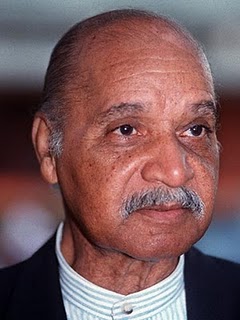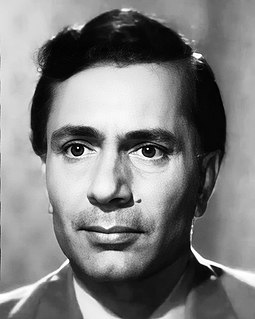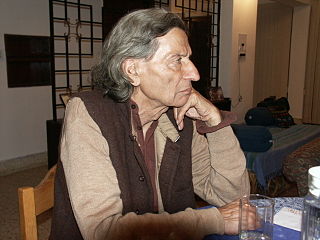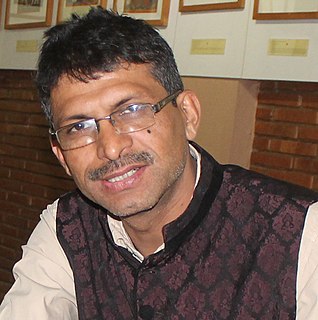
Ngũgĩ wa Thiong'o is a Kenyan author and academic who writes primarily in Gikuyu and who formerly wrote in English. He has been described as having been "considered East Africa’s leading novelist". His work includes novels, plays, short stories, and essays, ranging from literary and social criticism to children's literature. He is the founder and editor of the Gikuyu-language journal Mũtĩiri. His short story The Upright Revolution: Or Why Humans Walk Upright, is translated into 100 languages from around the world.

Faiz Ahmad Faiz was a Pakistani poet, and author of Urdu and Punjabi literature. Faiz was one of the most celebrated Pakistani Urdu writers of his time. Outside literature, he has been described as "a man of wide experience" having been a teacher, an army officer, a journalist, a trade unionist and a broadcaster.
Denys Johnson-Davies was an eminent Arabic-to-English literary translator who translated, inter alia, several works by Nobel Prize-winning Egyptian author Naguib Mahfouz, Sudanese author Tayeb Salih, Palestinian poet Mahmud Darwish and Syrian author Zakaria Tamer.
Meja Mwangi is a Kenyan writer. He has worked in the film industry, including in screenwriting, assistant directing, and casting.

José Craveirinha was a Mozambican journalist, story writer and poet, who is today considered the greatest poet of Mozambique. His poems, written in Portuguese, address such issues as racism and the Portuguese colonial domination of Mozambique. A supporter of the anti-Portuguese group FRELIMO during the colonial wars, he was imprisoned in the 1960s. He was one of the African pioneers of the Négritude movement, and published six books of poetry between 1964 and 1997. Craveirinha also wrote under the pseudonyms Mário Vieira, José Cravo, Jesuíno Cravo, J. Cravo, J.C., Abílio Cossa, and José G. Vetrinha.

Mahmoud Darwish was a Palestinian poet and author who was regarded as the Palestinian national poet. He won numerous awards for his works. Darwish used Palestine as a metaphor for the loss of Eden, birth and resurrection, and the anguish of dispossession and exile. He has been described as incarnating and reflecting "the tradition of the political poet in Islam, the man of action whose action is poetry." He also served as an editor for several literary magazines in Palestine.
The Progressive Writers' Association or the Progressive Writers' Movement of India or Anjuman Tarraqi Pasand Mussanafin-e-Hind ( or Akhil Bhartiya Pragatishil Lekhak Sangh was a progressive literary movement in pre-partition British India. Some branches of this writers' group existed around the world besides in India and Pakistan.

Balraj Sahni was an Indian film and stage actor, who is best known for Dharti Ke Lal (1946), Do Bigha Zameen (1953), Chhoti Bahen (1959), Kabuliwala (1961) and Garam Hawa (1973). He was the brother of Bhisham Sahni, noted Hindi writer, playwright, and actor.
African literature is literature from Africa, either oral ("orature") or written in African and Afro-Asiatic languages. Examples of pre-colonial African literature can be traced back to at least the fourth century AD. The best-known is the Kebra Negast, or "Book of Kings."
Alex La Guma was a South African novelist, leader of the South African Coloured People's Organisation (SACPO) and a defendant in the Treason Trial, whose works helped characterise the movement against the apartheid era in South Africa. La Guma's vivid style, distinctive dialogue, and realistic, sympathetic portrayal of oppressed groups have made him one of the most notable South African writers of the 20th century. La Guma was awarded the 1969 Lotus Prize for Literature.

Subhash Mukhopadhyay was one of the foremost Indian Bengali poets of the 20th century. He is also known as the "podatik kobi" in the field of Bengali literature. A book of thirty of Subhash's best known poems in English translation, titled ' As Day is Breaking', was published in 2014 by Anjan Basu, a Bangalore-based writer/critic. The book includes a rather detailed introduction to the poet's work as well. He was honoured with Jnanpith Award in 1991.

Bhisham Sahni was an Indian writer, playwright in Hindi and an actor, most famous for his novel and television screenplay Tamas, a powerful and passionate account of the Partition of India. He was awarded the Padma Bhushan for literature in 1998, and Sahitya Akademi Fellowship in 2002. He was the younger brother of the noted Hindi film actor, Balraj Sahni.

Kenyan literature describes literature which comes from Kenya. Kenya has a long oral and written literary tradition, primarily in English and Swahili, the two official languages of the country.

Keshav Malik was an Indian poet, art and literary critic, arts scholar, and curator. He remained art critic for the Hindustan Times (1960–1972) and The Times of India (1975–2000). He published eighteen volumes of poetry and edited six anthologies of English translations of Indian poetry.
The Text Book Centre Jomo Kenyatta Prize for Literature is a biennial literary award given by the Kenya Publishers' Association. It has been called "the most prestigious literary award in the country".
Sonomyn Udval was a Mongolian women's leader, politician and writer.

Suman Pokhrel is a Nepali poet, lyricist, playwright, translator and artist. Universities in Nepal and India have included his poetry in their syllabus.
Lotus was a trilingual political and cultural magazine which existed between 1968 and 1991. The magazine with three language editions was published in different countries: Egypt, Lebanon, Tunisia and German Democratic Republic.
Daisy Rockwell is an American Hindi and Urdu language translator and artist. She has translated a number of classic works of Hindi and Urdu literature, including Upendranath Ashk's Falling Walls, Bhisham Sahni's Tamas, and Khadija Mastur's The Women's Courtyard. Her 2021 translation of Geetanjali Shree's Tomb of Sand was the first South Asian book to win the International Booker Prize.









